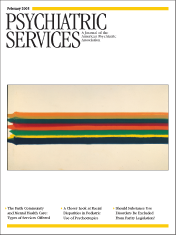A Patient's Perspective on Psychologist Prescribing
In Reply: We appreciate Mr. Ensign's candor and the concerns raised in his letter. First, we agree that having most antidepressants and anxiolytics prescribed by family practitioners and internists is a concern. Forming an alliance, establishing accurate diagnoses (including the differentiation of psychiatric disorders from substance use, medical, and neurological disorders), assessing and managing risk of harm to self or others, and optimizing psychological and pharmacological treatments while minimizing adverse treatment effects is a complex undertaking. Many conclude that psychiatrists have the training that best matches these requirements.
We disagree with Mr. Ensign's assertion that "serious errors in prescribing are nearly impossible in view of the fact that the similarities between the leading drugs to treat depression and anxiety disorders vastly exceed their relatively trivial differences." Adverse events do arise from drug-drug interactions and from the medications themselves; substantial harm can result. A few examples include the serotonin syndrome, the induction of mania in those with a bipolar diathesis, a discontinuation syndrome from the abrupt cessation of shorter-half-life selective serotonin reuptake inhibitors (SSRIs) and venlafaxine, and SIADH (syndrome of inappropriate antidiuretic hormone) from SSRIs. Last week a patient assessed at one of our medical centers for refractory depression had delirium caused by SSRI-induced hyponatremia.
Mr. Ensign's experience with six psychiatrists does not disprove the need for medical diagnostic skills to identify medical disorders whose manifestations overlap with psychiatric disorders and to uncover unrecognized comorbid medical or neurological conditions. In another recent example from the same medical center, a patient who was referred by her internist because of suspicions that her anorexia was being caused by psychiatric medication was found to have H. pylori-induced peptic ulcer disease.
Finally, Mr. Ensign argues that suboptimal psychiatric care from primary care physicians and internists is very prevalent; therefore, perhaps less suboptimal care by psychologists should be an acceptable alternative. Why not advocate for optimal care of psychiatric patients? Their substantial morbidity and mortality warrant the same specialized care as do patients with insulin-dependent diabetes mellitus or malignant hypertension.
Dr. Grasso and Dr. Shore are editors of Psychiatric Services' Patient Safety Forum.



